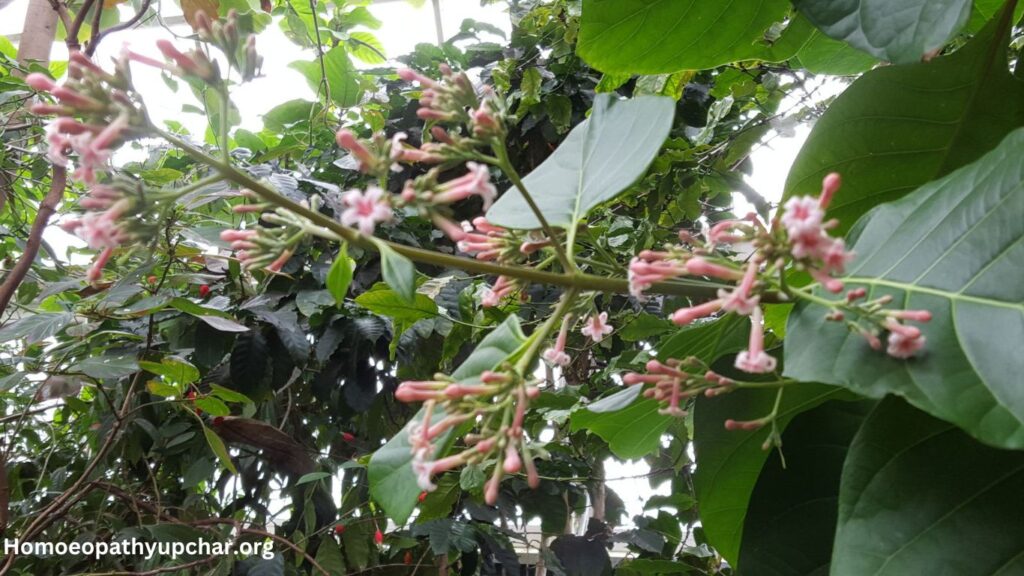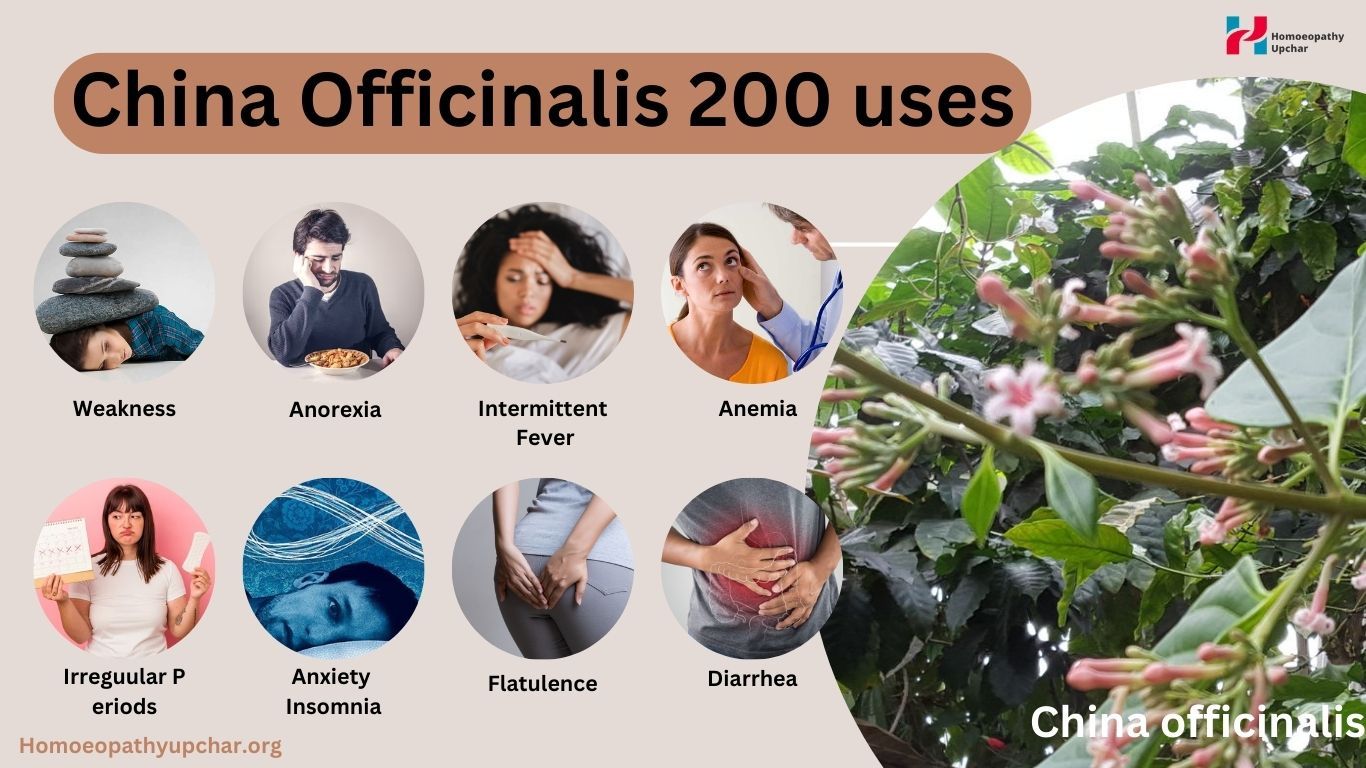China Officinalis, commonly known as China or Cinchona, is derived from the dried bark of the Cinchona Officinalis plant, also known as Peruvian bark and belonging to the rubiaceae family. China officinalis 200 uses are widely recognized as an effective remedy for various gastric issues, weakness, intermittent fever and other many ailments. The bark of the Cinchona tree was first introduced to Europe in the 17th century and quickly gained recognition for its potent medicinal properties. The bark’s active ingredient, quinine, became a standard treatment for malaria due to its antimalarial properties.
China Officinalis 200 Uses & Benefit.
Key indicating features
Intermittent fever with chills and shivering.
Profuse, debilitating sweats, especially at night.
Weakness and fatigue, often due to loss of vital fluids like blood or other bodily discharges (e.g., diarrhea, excessive menstruation).
Digestive disturbances, such as bloating, flatulence, and diarrhea, particularly after eating or drinking.
Anemia, with symptoms of pallor, weakness, and breathlessness Oversensitivity to touch and pain.
Neuralgic pains with periodicity.
MAIN ADVANTAGES-
Fatigue and Weakness:–

China officinalis 200 uses frequently indicated for individuals experiencing weakness and fatigue, especially after a prolonged illness or loss of vital fluids. Such as excessive sweating or prolonged illness. Like excessive lactation, long continued diarrhea, chronic suppuration and profuse hemorrhage. It is one of the best medicines for managing cases of weakness and fatigue. This medicine is mainly selected when weakness occurs after diarrhea, after bleeding (loss of blood). In males when weakness arises from excessive seminal emissions, this medicine can be really helpful. Females who suffer from weakness during breastfeeding, or after heavy periods may also find this medicine very useful to regain strength. Besides these its use can be done in cases of weakness that follows mental or physical exertion. This remedy works great for weakness after heavy periods.
Digestive Disturbances (gastric issue):- China officinalis 200 uses in gas, bloating, diarrhea, anorexia, vomiting, liver disorders This homeopathic remedy China officinalis 200 uses is known for its effectiveness in addressing digestive issues such as flatulence, bloating, and diarrhea. It can be particularly helpful in cases where there is a marked sensitivity to touch in the abdominal region.
- Gas (flatulence) :

It is very helpful to ease the complaint of gas (flatulence) in the abdomen. In cases needing it there is gas in the abdomen which is felt for a long time after eating along with bloating. Weight in the stomach occurs following eating even a slight amount of food. Burping that tastes like food or is bitter may occur but it affords no relief in bloating. Motion may relieve bloating. A person may also have pain in the abdomen from obstructed gas. It is better from bending double. Gas pain after operation can be managed well with it.
- Diarrhea :

Secondly, China officinalis 200 uses as a top grade medicine for managing diarrhea attended with excessive weakness. Stool is loose, brownish or yellowish, having undigested food particles with weakness. Passage of stool occurs with much escape of gas. Stool is offensive and can be frothy. It is also suitable when loose stool arises from eating fruit or drinking milk. Diarrhea occurring in hot weather is also treated magnificently with this remedy. This medicine can be given for cases of worm infestation as well. It is also used when there is vomiting that may be sour, of undigested food or of mucus.
- loss of appetite (anorexia) :

Another well known effect is to help cases of loss of appetite (anorexia). Persons who need it have an aversion to eating any sort of food and feel full all the time. China officinalis 200 uses can be given for a low appetite when a person feels stomach is full from eating very little food. Appetite loss in case of malaria is an important indication for its use. It can handle gastric issues that occur from eating fruit, fish or from drinking milk, impure water, tea and sour wine. Cases of food poisoning from drinking impure water or eating bad meat, bad fruit can be treated well with this medicine. This medicine also acts well on the liver and gallbladder. Here it proves to be effective to manage cases of liver inflammation, liver enlargement, liver cirrhosis, gallstones and its related colic.
Intermittent Fevers:-

China Officinalis is renowned for its effectiveness in treating intermittent fevers, a characteristic symptom of malaria. China officinalis 200 uses it helps alleviate associated symptoms like chills and sweating. It is curative in its own type of intermittent fevers, which are generally anticipated in nature. It may be tertian(occurs every second day ), double tertian, quotidian(occurs everyday) or double quotidian. The time of the paroxysm is not of much importance. It may begin at any time of the day, but it rarely happens at night time. The early symptoms and signs of illness are prominent because of its thirst, canine hunger, nausea, anguish, headache, debility and palpitation of the heart. The patient suffers from a feeling of general illness at this period. He is unhappy because of an undefined feeling of tiredness , melancholy and want of ease. He does not appreciate that these symptoms are merely the precursors of an attack of malaria or another illness involving fever and shivering..
Menstrual Irregularities:-

Women dealing with menstrual problems, including heavy bleeding or irregular cycles, may find relief through the use of China officinalis. Menses are too early and too profuse with pain (Dysmenorrhea) .The duration for the menstrual period too last long and the blood looks dark and this remedy is well marked when the patient feel severe headache and congestion in the head.
Anemia:-

Homeopaths often consider China Officinalis for cases of anemia where weakness, pale complexion, and sensitivity to touch are prominent features. When the quantity and quality of the blood are altered.person feels general weakness.Anemia and great weakness follows the loss of vital fluids , hemorrhage,prolonged and excessive lactation,diarrhea, face looks like pale,eyes are sunken and surrounded by dark rings.
OTHER BENEFITS –
Anxiety and Insomnia:-

In cases where anxiety or insomnia is accompanied by physical weakness and a sense of emptiness, China officinalis may be recommended as part of a holistic treatment plan.Person have no desire to live,but lacks courage to sucide. Dislikes to do mental or physical work,losts in his thoughts, lots of ideas crowded in mind which prevents sleep.
Post-illness Recovery:- Following a prolonged illness, China Officinalis can aid in the restoration of vitality and overall well-being.
China officinalis 200 Dosage & How to Take
- China officinalis Can be used from 30 C to 200 C to more higher 1M potency. Use it twice or thrice when used in 30C and 200C potency took May go China officinalis.
- The potency (power) used also depends on the symptoms of the patient which is determined by the doctor and higher potencies including 1M should not be repeated frequently.
- We recommend you to seek medical guidance.
- This is the dosage of China officinalis Dilution 30 CH recommended in most cases.
| Age Category | Dosage | |
Adult | Disease: Fever, Flatulence After or before eating: 1 hour gap Maximum quantity: 5 drop Type of medicine: Dilution 200 CH | Route of administration: Oral Intake regimen: 3 times Course of treatment: As per doctor’s advice Other Instructions: as per doctor’s instructions |
Elderly | Disease: Fever, Flatulence After or before eating: 1 hour gap Maximum quantity: 5 drop Type of medicine: Dilution 200 CH | Route of administration: Oral Intake regimen: 3 times Course of treatment: As per doctor’s advice Other Instructions: as per doctor’s instructions |
China Officinalis 200 Interactions with Food and Alcohol
- Keep a gap of half an hour between food/drink/any other medicine and China Officinalis 200 homeopathy medicine.
- While taking medicine, avoid any kind of strong smell in the mouth like camphor, garlic, onion, coffee, asafoetida.
- Avoid eating tobacco or drinking alcohol while on medication
China Officinalis 200 Side Effects
- Homeopathic medicines are prepared by potentization, that is, the substance is diluted and succussed (shaken vigorously) to produce a highly diluted remedy, which is why homeopathic medicines cause nominal side effects.
- However, any medicine should be taken in compliance with the stated rules. It is safe to take the medicine even if you are using another system of medicine like Allopathy, Ayurveda etc.
- China Officinalis 200 homeopathy medicines never interfere with the action of other medicines.
- If any side effects of China Officinalis are observed, they can be countered with
China Officinalis 200 Related Warnings
- Keep an interval of half an hour between eating/drinking/other medicines and homeopathic medicines.
- If you are pregnant or breastfeeding, consult a homeopathic practitioner before taking China Officinalis 200 homeopathy medicine.
- If other symptoms of illness occur, stop taking the medicine immediately and consult a doctor.
- keep your medicine out of the reach of children.
China Officinalis 200 Relation With Other Homeopathic Medicines
Complements– Ferrum metallicum
Remedies follow well- Acetic Acid, Acidum Phosphoricum Arsenicum Album, Arnica Montana,Asa Fśtida, Calcarea Carbonica, Carbo vegetabilis, Calcarea Phosphorica,Ferrum Metallicum, Lachesis,Mercurius Vivus,Phosphorus, Pulstilla nigricans, Sulphur, Veratrum album.
Inimicals- after Digitalis Purpurea and Selenium
Antidotes- Apis Mellifica, Aranea Diadema, Arnica Montana, Arsenicum Album, Asa Fśtida, Belladonna, Bryonia Alba, Calcarea Carbonica, Capsicum, Carbo Animalis, Causticum, Cedron, Cina, Eupatorium Perfoliatum, Ferrum Metallicum, Ipecacuanha, Lachesis, Ledum Palustre, Lycopodium Clavatum, Menyanthes, Mercurius Vivus, Natrum Carbonicum, Natrum Muriaticum, Nux Vomica, Pulsatilla Nigricans, Rhus Toxicodendron, Sepia, Sulphur, Veratrum Album
Antidote by- Antimonium Tartaricum, Arnica Montana,Arsenicum Album, Asa Fśtida, Aurum Metallicum, Calcarea Carbonica, Capsicum, Chamomilla, Cina, Coffea Cruda, Cuprum Metallicum, Ferrum metallicum, Gelsemium Sempervirens, Helleborus Niger, Hyoscyamus Niger, Iodium, Ipecacuanha, Kali Iodatum, merc, Sulphur.
See All Substitutes For China Officinalis 200 Dilution
What Is China Officinalis ?

China officinalis, commonly known as Cinchona officinalis, is a plant native to the Andean forests of South America, particularly Peru and Ecuador. The bark of this tree is renowned for its historical use in traditional medicine, particularly in the treatment of fevers and malaria.
The bark contains alkaloids, most notably quinine, which has antipyretic (fever-reducing) and antimalarial properties. Due to its effectiveness against malaria, quinine became a vital treatment for the disease during the colonial era. Even today, derivatives of quinine are used in some modern antimalarial medications.
In homeopathy, China officinalis is used to prepare a remedy called Cinchona or China. Homeopathy is a system of alternative medicine that involves treating a condition with highly diluted substances, with the belief that these preparations can stimulate the body’s healing processes.
China officinalis, in the context of homeopathy, is often employed for various conditions, including digestive issues, weakness, and intermittent fevers. It is important to note that homeopathic remedies are highly diluted, and their mode of action is based on the principle of “like cures like” and the concept of potentization.
As a Homeopathic Remedy
In 1790 in the study room of Hahnemann, it was cinchona bark which revealed to him the unique system of treatment ‘homeopathy’. After passing the MD, then the highest examination in allopathy and practicing it for about 10 years, Hahnemann became completely disappointed and disgusted with the crude, inhuman, torturing, troublesome and harmful system of allopathic treatment. He was a master of languages. Therefore, he decided to earn his livelihood by the most innocent, yet useful profession of translating various books into different languages,
while doing so he he came across the fact that cinchona bark has the power of producing malaria, like symptoms in healthy human beings, andThis led him to conclude that if China Officinalis has the ability to induce malaria-like symptoms in healthy individuals, it is also capable of treating the natural disease, which presents symptoms similar to malaria, in people who are sick. With this idea of, he himself took a little quantity of the juice expressed from the Cinnabar, and he was soon sick with the similar symptoms to malaria. He conducted the experiment on his family members and friends, obtaining consistent results.. This was the beginning of the historic invention of homeopathy.
Through a homeopathic process that extracts and enhances its medicinal properties, the dried bark of this plant becomes a potent and valuable homeopathic medicine.
Historical Perspective
Discovery of Cinchona Bark: The use of Cinchona bark dates back to the indigenous people of South America, who utilized it for treating fevers. The bark gained prominence when it was introduced to Europe in the 17th century.
Hahnemann and the Principle of Similars: Homeopathy was founded by Samuel Hahnemann, a German physician, in the late 18th century. One of the key principles of homeopathy is the Law of Similars, which states that a substance that causes symptoms in a healthy person can be used to treat similar symptoms in a sick person.Hahnemann experimented with various substances, including Cinchona bark, and observed its effects on the human body.
China Officinalis in Homeopathy: Hahnemann’s experiments with Cinchona bark led to the development of the homeopathic remedy China officinalis.China is often prescribed for conditions characterized by weakness, debility, and periodic fevers. It has been traditionally used in homeopathy for ailments related to loss of vital fluids, such as excessive bleeding or diarrhea.
Potentization and Dilution: The preparation of homeopathic remedies involves a process known as potentization, where the original substance is repeatedly diluted and succussed (shaken vigorously).China officinalis is prepared in various potencies, such as 6X, 30C, or 200CH, indicating the degree of dilution and succussion.
Integration into Homeopathic Practice: China officinalis has been integrated into the materia medica of homeopathic remedies. Homeopaths may consider prescribing it based on the patient’s specific symptoms, constitutional characteristics, and the principle of similarity.
Contemporary Usage: China officinalis continues to be a part of the homeopathic pharmacopeia, and practitioners may recommend it for conditions aligned with its historical use and homeopathic principles.
Preparation of China Officinalis
It appears there might be a confusion in the terminology. “China Officinalis” is a homeopathic remedy derived from the Peruvian bark, also known as Cinchona bark. The name “China” is used in homeopathy to refer to Cinchona officinalis. It is commonly used for various health issues, including digestive problems, weakness, and intermittent fevers.Here’s a general guideline for preparing a homeopathic remedy from China Officinalis:
Source Material: China Officinalis is derived from the dried bark of the Cinchona tree. The bark is typically harvested, dried, and then processed for homeopathic preparation.
Potentization: The homeopathic preparation involves a process called potentization, where the original substance is diluted and succussed (vigorously shaken). This process is believed to enhance the healing properties of the substance while minimizing its toxicity.
Dilution and Succussion: The bark is diluted in a mixture of water and alcohol, and then vigorously shaken or succussed. This process is usually repeated multiple times, resulting in different potencies of the remedy (e.g., 6X, 30C, etc.). The potency indicates the degree of dilution and succussion.
Remedy Forms: China Officinalis is then prepared in various forms such as liquid tinctures, pellets, or sugar pills.
It appears there might be a confusion in the terminology. “China Officinalis” is a homeopathic remedy derived from the Peruvian bark, also known as Cinchona bark. The name “China” is used in homeopathy to refer to Cinchona officinalis. It is commonly used for various health issues, including digestive problems, weakness, and intermittent fevers. Here’s a general guideline for preparing a homeopathic remedy from China Officinalis:
Source Material: China Officinalis is derived from the dried bark of the Cinchona tree. The bark is typically harvested, dried, and then processed for homeopathic preparation.
Potentization: The homeopathic preparation involves a process called potentization, where the original substance is diluted and succussed (vigorously shaken). This process is believed to enhance the healing properties of the substance while minimizing its toxicity.
Dilution and Succussion: The bark is diluted in a mixture of water and alcohol, and then vigorously shaken or succussed. This process is usually repeated multiple times, resulting in different potencies of the remedy (e.g., 6X, 30C, etc.). The potency indicates the degree of dilution and succussion.
Remedy Forms: China Officinalis is then prepared in various forms such as liquid tinctures, pellets, or sugar pills.
Bottling: Once the desired potency is reached, the remedy is then bottled and labeled accordingly. It is now ready for use.China Officinalis , the potentization process can result in extremely high dilutions, such as 6C, 30C, or 200C. Homeopaths believe that the more a substance is diluted and succussed, the more potent and effective it becomes. This is a fundamental principle of homeopathic preparation.
Clinically
- Anemia
- Abdominal disorder
- Bilious attack
- Catarrhal affection
- Constipation
- Diarrhea
- Dropsy
- Dyspepsia
- Deafness
- Gall stone colic
- Hemorrhage
- Headache
- intermittent fever
- Jaundice
- Labour
- Liver complaints
- Pain
- Menstrual troubles
- Rheumatism
- Respiratory troubles
- Spleen affection
- Vertigo, etc.
Drug Action
China predominantly acts on the blood cardiovascular system, gastrointestinal tract, lever, spleen and respiratory organs. It also works well in elements of the nervous system, brain and mind.
It acts upon the nervous system and helps with the condition of depression and exhaustion .
It helps to cure jaundice and other liver complaints. China officinalis has great power to cure fever of various types. It is the most situated remedy in intermittent fever.
Complementary Medicine
Ferrum metallicum
Conclusion
China Officinalis, derived from the Cinchona plant, stands as a testament to the rich history and therapeutic potential of homeopathic medicine. Its application in addressing weakness, debility, and various health conditions aligns with the holistic principles of homeopathy. As with any homeopathic remedy, seeking professional advice ensures a tailored approach to individual health needs. Embracing the healing power of China Officinalis may offer a natural and gentle way to restore balance and well-being in the journey toward optimal health.
Frequently asked Questions about China Officinalis Dilution 30
Question- What is the full name of China ?
Answer- Full name of china is china officinalis.
Question- What is another name for china or china officinalis ?
Answer- The other name for it is cinchona ofiicinalis and its the first ever homeopathic medicine proven by the father of homeopathy Dr Samuel Hahnemann a German physician.
Question- What is China Officinalis 200 homeopathy medicine and how is it derived?
Answer- China Officinalis Stands as a significant and versatile homeopathic remedy, drawing its potency; it is derived from quinine whose scientific name is cinchona officinalis
Question- What are the key characteristics of individuals who might benefit from China Officinalis ?
Answer- China Officinalis 200 homeopathy medicine remedy is suitable to plethoric (having excess of blood) individuals disposed to inflammations with a red, congested, hot face. It also suits people who are prone to glandular swellings.
Question- What are the common uses of China Officinalis in homeopathic practice?
Answer- China Officinalis 200 homeopathy is a leading medicine to treat general weakness, debility, anemia, flatulance and other medical conditions
Question- Is China Officinalis 200 homeopathy medicine Safe for use and are there any potential side effects?
Answer- Selection of remedy and the potency of that remedy depends upon the symptoms of the patient which is selected by the physician.
Question- Can China Officinalis 200 homeopathy be used in conjunction with conventional medicine?
Answer- Of course homeopathic medicines are highly diluted and it does not interfere with Medicinal action of any other medicinal system.
Question- What is the typical dosage and for China Officinalis 200 homeopathy medicine?
Answer- The typical doses for legacy given in 30 potency TDS.
Question- Can pregnant or breastfeeding individuals use China Officinalis 200 homeopathy?
Answer- yes it is safe for pregnant or breastfeeding individuals.
Question- Where can individuals find China Officinalis homeopathic medicine?
Answer- you can find China Officinalis 200 homeopathy medicine in the above given links.
Question- How can one find a qualified homeopathic practitioner for guidance on China Officinalis ?
Answer- you can consult your nearby registered homeopathic practitioner or you can contact us for online consultation and treatment.
Question- Can China Officinalis 200 homeopathy medicine be used for pets or animals?
Answer- yes homeopathic medicines also works magically on animals too we recommend you to ask a doctor.
Question- How many types of potencies are there in China Officinalis ?
Answer- China Officinalis available in a variety of potencies, ranging from low potency (eg: 3X /6X) to high potency (eg: 30C,200C etc.).
Question- How are the potency and quantity of China Officinalis Dilution determined?
Answer- Homeopathic doctors determine its dosage based on the symptoms of the patient.
Question- What are the main indications in which China Officinalis 200 homeopathy medicine Can be used?
Answer- Especially in weakness, flatulence and debility.
Question- Is there any specific time to take China Officinalis 200 homeopathy medicine ?
Answer- China Officinalis 200 homeopathy medicine can be taken anytime within a gap of half an hour before or after meals.
Question- Can China Officinalis Dilution be used in children or during pregnancy?
Answer- China Officinalis Dilution is safe to use even during pregnancy.
Question- How long should China Officinalis 200 homeopathy medicine be taken for it to be effective?
Answer- As per doctor’s advice.
Question- Can China Officinalis be taken with other homeopathic or classical medicines?
Answer- Yes, china officinaliscan be taken with other homeopathic medicines but it is necessary to consult a doctor before mixing the two medicines.
Question- What should I do if I experience any overdose or agitation after taking China Officinalis 200?
Answer- Stop using the medicine immediately and consult your doctor
Question- Is China Officinalis beneficial in mental diseases?
Answer- Yes, China Officinalis 200 homeopathy medicine appropriate results are seen in mental diseases
Question- Should I continue using China Officinalis 200 homeopathy medicine if my symptoms improve?
Answer- China Officinalis 200 homeopathy medicine administration continues As per doctor’s instructions.

